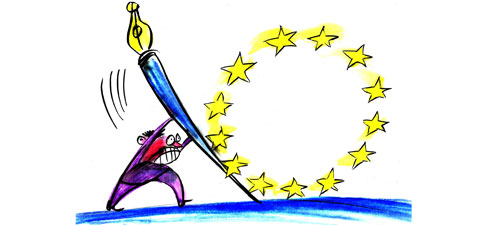Germany's European policy is about to undergo a transformation as significant as Ostpolitik - the country's improvement of relations with the Soviet bloc - was in the early 1970s. While that policy was characterized by the slogan "change through rapprochement," Berlin's new approach might be dubbed "more justice through more Europe."
In both cases, it is a question of overcoming a divide, between the East and the West in the 1970s and between north and south today. Politicians tirelessly insist that Europe is a community of fate. It has been that way since the establishment of the European Union. The EU is an idea that grew out of the physical and moral devastation following World War II. Ostpolitik was an idea devoted to defusing the Cold War and perforating the Iron Curtain.
Unlike earlier nations and empires that celebrated their origins in myths and heroic victories, the EU is a transnational governmental institution that emerged from the agony of defeat and consternation over the Holocaust. But now that war and peace is no longer the overriding issue, what does the European community of fate signify as a new generational experience? It is the existential threat posed by the financial and euro crisis that is making Europeans realize that they do not live in Germany or France, but in Europe. For the first time, Europe's young people are experiencing their own "European fate." Better educated than ever and possessing high expectations, they are confronting a decline in the labor markets triggered by the threat of national bankruptcies and the economic crisis. Today one in five Europeans under 25 is unemployed.
A new age of risky confusion
In those places where they have set up their tent cities and raised their voices, they are demanding social justice. In Spain and Portugal, as well as in Tunisia, Egypt and Israel ( unlike Great Britain ), they are voicing their demands in a way as nonviolent as it is powerful. Europe and its youth are united in their rage over politicians who are willing to spend unimaginable sums of money to rescue banks, even as they gamble away the futures of their countries' youth. If the hopes of Europe's young people fall victim to the euro crisis, what can the future hold for a Europe whose population is getting older and older?
News programs offer new visual material for the dawning of a new age of risky confusion - the "world risk society" - on an almost daily basis. The headlines have been interchangeable for some time: Insecurity Over the Future of the Global Economy, EU Bailout Fund in Jeopardy, Merkel Attends Crisis Meeting with Sarkozy, Rating Agency Announces Downgrade of US Debt. Does the global financial crisis signal the deterioration of the old center? Ironically, it is authoritarian China that is playing the moral apostle on the financial front, with its sharp criticism of both democratic America and the EU. Read full essay in English at Spiegel Online International...
Was this article useful? If so we are delighted!
It is freely available because we believe that the right to free and independent information is essential for democracy. But this right is not guaranteed forever, and independence comes at a cost. We need your support in order to continue publishing independent, multilingual news for all Europeans.
Discover our subscription offers and their exclusive benefits and become a member of our community now!












